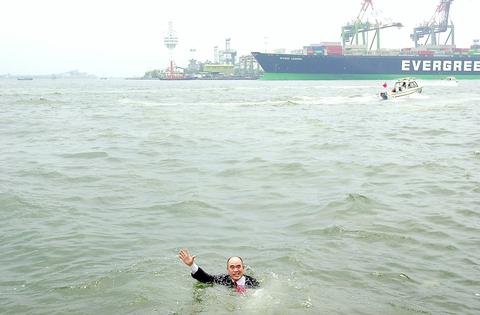President Chen Shui-bian (
"The relationship between central and local governments is one of partnership. It is not a competitive one or one in which one [government] dominates the other. The potential of Kaohsiung is greater than that of Taipei, so the prospects for the city's future will be immeasurable after the merger," Chen said during a boat trip, while leading a group of media executives to the city's harbor district.
Having taken a strong position on the merger, Kaohsiung Mayor Frank Hsieh (

PHOTO: CHANG CHUNG-YI, TAIPEI TIMES
"The establishment of an administrative board [to facilitate the transfer of managerial authority from the central government to Kaohsiung City] aims to address shipping companies' concerns, by making it clear that the harbor is not fully under the city government's control. The city government will improve the integration of city and harbor development plans," Hsieh said.
Although the Kaohsiung City Council is still opposed to certain details of the Cabinet's merger plan, Hsieh said that he would continue to press the legislature for a "much more complete" merger.
In accordance with the Ministry of Transportation and Communications' plan, administrative boards will soon be set up in all four of Taiwan's international harbors.
Nine to 13 board members, recommended by local governments and approved by the ministry, will be appointed to run each board, headed by local mayors and in Hualien's case, a county commissioner.
The four international harbors in Taiwan are Kaohsiung, Keelung, Taichung and Hualien Harbors.
Upon Chen's arrival at the harbor, Kaohsiung City Councilor Chen Tsun-hsiung (
"It's the passing of a milestone for Kaohsiung. I fully support it," Chen said as he stood in the water, treading water excitedly to indicate his satisfaction with the news.
Expressing his excitement, President Chen also said that he felt "closer to the southern sea after setting foot in the harbor," and that it helped him to reflect more easily on the meaning of Taiwan being an "ocean country."
President Chen, in addition, urged Kaohsiung Harbor to maintain its competitiveness with other international harbors in the world, adding that the central government should work hand in hand with local governments to create a "win-win" situation.
Commenting on the differences between northern and southern cities, President Chen also said that "inappropriate government policies" had led to the rising unemployment rate, lack of medical and other resources, and underdevelopment in the south.
Consequently, he said, he has ordered certain important gatherings, such as state banquets, be held in central and southern Taiwan.
Recalling his past experiences as a maritime lawyer, President Chen added yesterday that he was delighted to meet former clients in Kaohsiung, including the head of the Kaohsiung Harbor Bureau who briefed yesterday's meeting.

CHAOS: Iranians took to the streets playing celebratory music after reports of Khamenei’s death on Saturday, while mourners also gathered in Tehran yesterday Iranian Supreme Leader Ayatollah Ali Khamenei was killed in a major attack on Iran launched by Israel and the US, throwing the future of the Islamic republic into doubt and raising the risk of regional instability. Iranian state television and the state-run IRNA news agency announced the 86-year-old’s death early yesterday. US President Donald Trump said it gave Iranians their “greatest chance” to “take back” their country. The announcements came after a joint US and Israeli aerial bombardment that targeted Iranian military and governmental sites. Trump said the “heavy and pinpoint bombing” would continue through the week or as long

TRUST: The KMT said it respected the US’ timing and considerations, and hoped it would continue to honor its commitments to helping Taiwan bolster its defenses and deterrence US President Donald Trump is delaying a multibillion-dollar arms sale to Taiwan to ensure his visit to Beijing is successful, a New York Times report said. The weapons sales package has stalled in the US Department of State, the report said, citing US officials it did not identify. The White House has told agencies not to push forward ahead of Trump’s meeting with Chinese President Xi Jinping (習近平), it said. The two last month held a phone call to discuss trade and geopolitical flashpoints ahead of the summit. Xi raised the Taiwan issue and urged the US to handle arms sales to

State-run CPC Corp, Taiwan (CPC, 台灣中油) yesterday said that it had confirmed on Saturday night with its liquefied natural gas (LNG) and crude oil suppliers that shipments are proceeding as scheduled and that domestic supplies remain unaffected. The CPC yesterday announced the gasoline and diesel prices will rise by NT$0.2 and NT$0.4 per liter, respectively, starting Monday, citing Middle East tensions and blizzards in the eastern United States. CPC also iterated it has been reducing the proportion of crude oil imports from the Middle East and diversifying its supply sources in the past few years in response to geopolitical risks, expanding

Pro-democracy media tycoon Jimmy Lai’s (黎智英) fraud conviction and prison sentence were yesterday overturned by a Hong Kong court, in a surprise legal decision that comes soon after Lai was jailed for 20 years on a separate national security charge. Judges Jeremy Poon (潘兆初), Anthea Pang (彭寶琴) and Derek Pang (彭偉昌) said in the judgement that they allowed the appeal from Lai, and another defendant in the case, to proceed, as a lower court judge had “erred.” “The Court of Appeal gave them leave to appeal against their conviction, allowed their appeals, quashed the convictions and set aside the sentences,” the judges